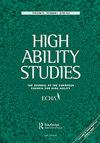The influence of emotions and learning preferences on learning strategy use before transition into high-achiever track secondary school
IF 1.8
4区 教育学
Q2 EDUCATION, SPECIAL
引用次数: 9
Abstract
Research on the relationships between students’ achievement emotions and their (self-regulated) learning behavior is growing. However, little is known about the relationships between students’ learning preferences and achievement emotions and the extent to which these influence learning strategies. In this study we, first, looked at the learning-style preferences (self-regulated, externally regulated, or impulsive learning) of 200 fourth graders who were about to start high-achiever track secondary school in Germany in the following school year. Second, we analyzed whether students who prefer self-regulated learning, externally regulated learning, or impulsive learning differ concerning the achievement emotions of enjoyment, anger, boredom, and anxiety. Third, we examined whether the degree to which students prefer self-regulated learning in combination with their achievement emotions predicts if and how students actually apply various aspects of self-regulated learning such as cognitive learning strategies, goal setting, and strategy monitoring during their learning. Fourth, we explored whether achievement emotions mediate relationships between more or less successful learning and subsequent learning behavior. Students in our sample did not prefer a self-regulated learning style over an externally regulated or impulsive learning style; and achievement emotions were shown to be related to students’ learning-style preferences. Students’ preference for self-regulated learning in combination with their achievement emotions predicted various aspects of their learning. However, achievement emotions did not mediate changes in learning behavior found after less successful learning.升入高成就中学前情绪和学习偏好对学习策略使用的影响
关于学生成就情绪与自我调节学习行为之间关系的研究越来越多。然而,关于学生的学习偏好和成就情绪之间的关系以及它们对学习策略的影响程度,我们知之甚少。在这项研究中,我们首先观察了200名四年级学生的学习风格偏好(自我调节,外部调节或冲动学习),他们将在接下来的学年开始在德国的高成就跟踪中学学习。其次,我们分析了自主调节学习、外部调节学习和冲动性学习的学生在享受、愤怒、无聊和焦虑的成就情绪方面是否存在差异。第三,我们研究了学生对自我调节学习的偏好程度与他们的成就情绪是否能预测学生在学习过程中是否以及如何实际应用自我调节学习的各个方面,如认知学习策略、目标设定和策略监控。第四,我们探讨了成就情绪是否在成功或不成功的学习与随后的学习行为之间起到中介作用。在我们的样本中,学生并不喜欢自我调节的学习方式而不是外部调节或冲动的学习方式;成就情绪与学生的学习方式偏好有关。学生对自我调节学习的偏好与他们的成就情绪相结合,预测了他们学习的各个方面。然而,成就情绪并没有调节学习不成功后的学习行为变化。
本文章由计算机程序翻译,如有差异,请以英文原文为准。
求助全文
约1分钟内获得全文
求助全文
来源期刊

High Ability Studies
Multiple-
CiteScore
4.80
自引率
11.10%
发文量
7
期刊介绍:
High Ability Studies provides a forum for scholars in a variety of disciplines associated with the development of human abilities to their highest level. It is a medium for the promotion of high ability, whether through the communication of scientific research, theory, or the exchange of practical experience and ideas. The contents of this journal are unique in reflecting concerns and recent developments in this area from childhood and across the whole life span in a variety of contexts. Far from being restricted to the traditional focus on high-level cognitive development, it also presents investigations into all other areas of human endeavour, including sport, technology, the arts, business, management and social relations.
 求助内容:
求助内容: 应助结果提醒方式:
应助结果提醒方式:


